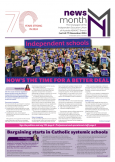
Is the annual goal-setting and professional development process at your school too demanding? Get the facts from the AITSL Australian Teacher Performance and Development Fact Sheet, developed in collaboration with the IEU in 2024.
Download a PDF of the 4-page liftout
Download the Fact Sheet
Australian Teacher Performance and Development Framework (ATPDF)
The IEU has worked with the Australian Institute of Teaching and School Leadership (AITSL) to clarify what is – and is not – required for compliance with the annual goal-setting and professional learning process in the Australian Teacher Performance and Development Framework.
The ATPDF was implemented in 2012. As with many other policies and frameworks, the quantity and type of documentation demanded of teachers has intensified exponentially over time, thereby increasing teacher workloads unnecessarily.














































































































































